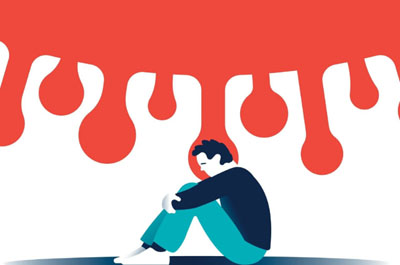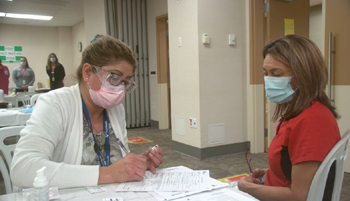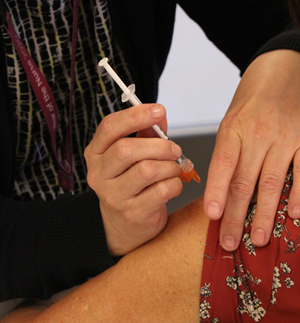
Friday December 8, 2023 | VICTORIA, BC
by Mary P Brooke | Island Social Trends
A number of people in Canada continue to experience long-term impacts of COVID-19 (SARS-CoV-2) infection, now three years past the onset of the virus in Canada and around the world.
Cases of novel coronavirus (nCoV) were first detected in China in December 2019, with the virus spreading rapidly to other countries across the world. This led the World Health Organization (WHO) to declare a Public Health Emergency of International Concern (PHEIC) on January 30, 2020 and to characterize the outbreak as a pandemic on March 11, 2020.
In British Columbia, the public health emergency was declared on March 17, 2020 followed by a state of emergency being declared on March 18, 2020 (which was renewed every two weeks through to June 30, 2021).
Vaccine products were available to health-care workers in December 2020 and to the general public across BC starting January 2021, with boosters in 2022, and now continue within a framework of the annual fall/winter respiratory season (with a COVID and flu combo immunization offering).
Journalism timeline:
Most of the professional media in BC were following the COVID news as it rolled out.
Island Social Trends attended all the remote news conferences for over two years, and was the first news outlet to query BC Provincial Health Officer Dr Bonnie Henry about long-COVID (before it was even called that), as well as about MIS-C (multi-system inflammatory syndrome in children) before the condition was officially established, as well as querying why young adults (the work force and parents of young families) were left to last in the immunization strategy.
On July 2, 2020 Dr Henry first clarified the symptoms of long-COVID in a news session from Vancouver.

Long-term symptoms:
Today Statistics Canada released a report called “Experiences of Canadians with long-term symptoms following COVID-19”, with five key findings from a study conducted in 2023.
Stats Canada notes that as of June 2023, the majority of Canadians had been infected by the virus causing COVID-19. “Most people recover from their symptoms and are able to carry on with their lives, however, for many others, symptoms persist for months, often impacting their ability to work and their quality of life overall,” it was stated in the report.
Findings from the new study released today examines COVID-19 infections including reinfections, long-term symptoms and their impact on the Canadian adult population more than three years since the beginning of the pandemic.
Pre-vaccination infection:
The report states that people who were infected earlier in the pandemic — before vaccination and the emergence of the Omicron variant — were more likely to develop long-term symptoms, but also had more time since their first infection to fall ill from COVID-19 again.
Data from 2023 survey:
The study is based on data from the 2023 Canadian COVID-19 Antibody and Health Survey—Follow-up Questionnaire which are also being released today.
The survey and the study were both done in partnership with the Public Health Agency of Canada.
Five key findings:
The following are five key findings of the study regarding long-term symptoms of COVID-19 [download the full study report – Experiences of Canadians with long-term symptoms following COVID-19 – PDF]:
- Nearly one in five Canadian adults have had more than one known or suspected COVID-19 infection
The percentage of Canadian adults who ever tested positive for or suspected a COVID-19 infection (based on symptoms or recent contact with a COVID-19 infected person) increased from 38.7% in the summer of 2022 to 64.4% by June 2023. Many Canadian adults have had COVID-19 more than once. As of June 2023, 44.6% of Canadians had experienced one infection, 14.4% had experienced two, and 5.4% had experienced three or more. These numbers, however, are likely an underestimate of the true number of infections by June 2023, as individuals may not always be aware that they are or have been infected. - About one in nine of all Canadian adults have experienced long-term symptoms from a COVID-19 infection
By June 2023, about one in nine (11.7%) of the total adult population reported experiencing long-term symptoms, defined as the presence of symptoms three or more months after a COVID-19 infection that could not be explained by anything else. This represents 3.5 million Canadians, and nearly 1 in 5 (19.0%) Canadian adults who had been infected at least once. - Over half (58.2%) of Canadian adults who ever had long-term symptoms continued to experience these symptoms up to June 2023
Of those who continue to experience long-term symptoms, 79.3% had been experiencing symptoms for six months or more, including 42.2% with symptoms for one year or more. In contrast, among those who reported a resolution of their long-term symptoms, almost three-quarters (73.9%) experienced them for fewer than six months, and 93.0% experienced them for less than a year. - About 7 in 10 Canadian adults with long-term symptoms experienced them on a daily or nearly daily basis
The impacts of long-term symptoms on Canadians’ daily lives vary depending on the severity and frequency of their symptoms. Among those who continued to experience symptoms in June 2023, about 7 in 10 reported experiencing them every day or almost every day when symptoms were at their worst, and about 1 in 5 (21.7%) reported being often or always limited by them in their daily activities. Overall, half (49.7%) of people with ongoing symptoms reported no improvement in their symptoms over time. - Two-thirds of Canadian adults who sought healthcare services for their long-term symptoms reported not receiving adequate care for any of their symptoms
Among Canadians with long-term symptoms who needed healthcare services, two-thirds (66.4%) reported not receiving adequate treatment, service, or support for any of their symptoms, one in five (21.1%) reported receiving adequate care for some of their symptoms and one in eight (12.5%) adults reported receiving treatment, services, or support for all their symptoms.
Economic and social impacts:
In addition to the physical impacts of COVID, there are long-term impacts for individuals, households, communities, businesses and society overall that reach into the realm of emotional-social well-being as well as financial.
===== ABOUT THE WRITER:
Island Social Trends Editor Mary P Brooke, B.Sc. covered the COVID-19 pandemic throughout the daily news conferences in 2020 through 2022, and continuing episodically in 2023 and beyond. All articles are published in the COVID NEWS ARCHIVE.
Ms Brooke has been publishing local and regional news since 2008, expanding to a BC-level during the pandemic. She now reports with the BC Legislative Press Gallery to produce news insights of value to individuals, households, communities and businesses.
Mary Brooke was nominated for a Jack Webster Journalism Award in 2023 for contributing to her community through journalism.
===== RELATED:
- National observance of 3 years into the COVID pandemic (March 11, 2023)
- COVID update July 2: more cases in BC, long-term health effects for all ages (July 2, 2020)
- COVID NEWS ARCHIVE by Island Social Trends (2019 to present)








